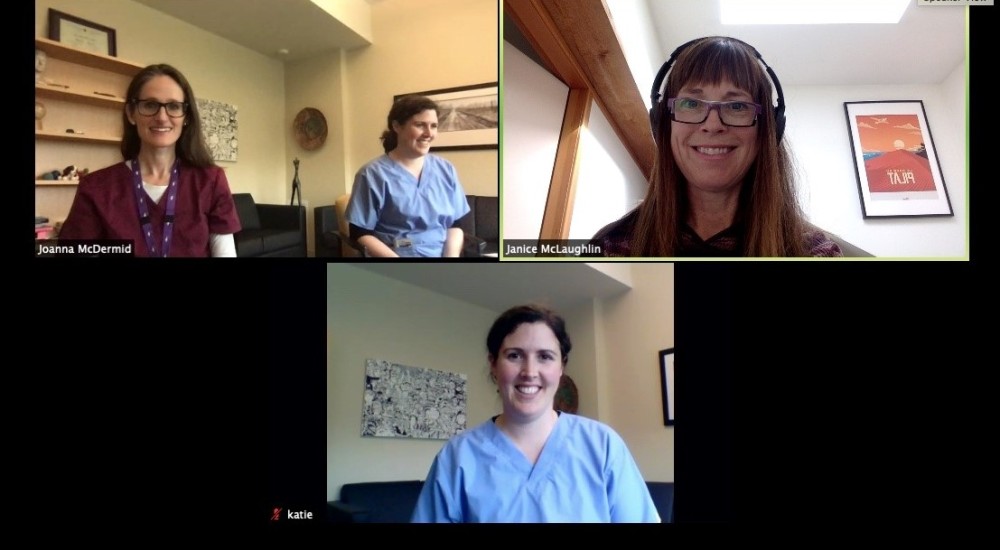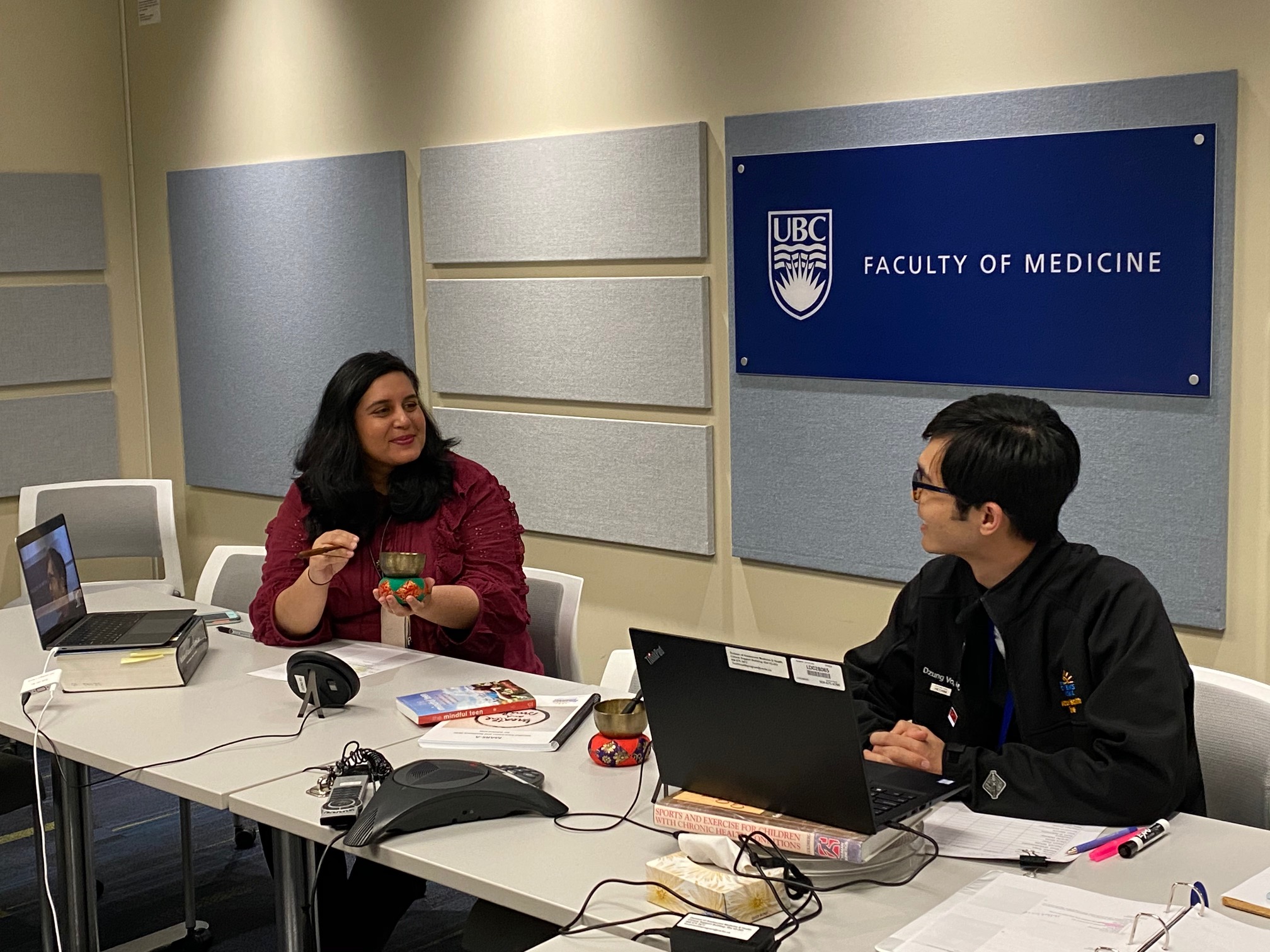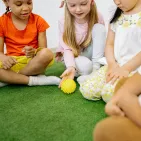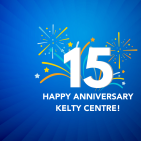
This spring, BC Children’s Hospital has been piloting MARS-A (Mindful Awareness and Resilience Skills for Adolescents), our 8-week mindfulness training programs for teens, via virtual health for the first time ever. We are just a few weeks into it, but already we are learning some valuable lessons, and having a lot of fun along the way!
Crisis = Danger + Opportunity
Our colleagues at Sick Kids Hospital in Toronto (Nicholas Chadi, then an adolescent medicine fellow at University of Toronto; Elli Weisbaum; and Sara Kohut) first approached Jake Locke and myself a few years ago with a two-part question: Could they learn the MARS-A intervention from us, and could they trial a pilot online MARS-A via e-health (videoconference) as a research study? The answer to the first question was an easy yes, but to be honest I was skeptical about the second question. I wondered, How could the mindful community and connection “feel” that we are able to create with teens in person, be replicated in an online format? Despite my initial bias, I did my best to keep a “beginner’s mind,” and support the project with curiosity and without any particular expectations. Soon, the team at Sick Kids began reporting great success, which got us at BC Children’s Hospital talking about how we could offer something like this in BC. We wanted to offer MARS-A to teens across BC, and we knew that coming to BC Children’s Hospital in Vancouver weekly for 8 weeks was a barrier to many.
When the COVID-19 pandemic arrived in Canada in early March, we had already done the intakes and scheduled our Spring 2020 MARS-A cohort. We did not want to cancel it, especially because we hoped that mindfulness could help our teens cope with the stress of this unprecedented situation. We also felt that during this time of physical distancing and potential social isolation, mindful community-building was more important than ever. At the same time, in the midst of the pandemic, all of our health systems were moving very rapidly towards virtual health. We knew that we had little choice but to take this crisis as an opportunity to offer MARS-A via virtual health in BC.
Creating a Mindful Environment
Of course, adolescents are “digital natives,” and are at baseline more comfortable than many adults at interacting and communicating over digital platforms. At the same time, we wanted to do our best to create an online environment which offered the same kind of caring, presence, and “heartfulness” that we try to offer at our in-person MARS-A groups. As it turned out, the virtual format allowed some teens to feel more “at home” while participating in MARS-A, and we invited them to bring in pillows, blankets, and snacks of their choice to get “extra comfy.”
In order to create a safe and respectful group environment, we also discussed and asked the teens for some online “group agreements,” in addition to our usual in-person group agreements. We asked participants to do their best to find a quiet and private space. We invited them to turn off all other electronic devices, windows, and applications for the duration of the group. We agreed on body language to be able to communicate clearly with each other, such as “thumbs up,” or “pass (I don’t wish to share right now,” and we’ve found unexpected joy and connectedness in communicating with each other on-screen in this way. We also asked all participants to commit to maintaining confidentiality within the group, which included no recording or saving any of the session.
Tech Stuff
It turns out that Zoom has been a fantastic platform for online therapeutic groups, and most of the teens were already familiar with how to use it. We have been experimenting with the facilitators’ positioning and camera angles, keeping in mind the limitation of physical distancing for infection control. What has seemed to work well so far is for each facilitator to have their own laptop with camera, so that participants could see each facilitator’s face clearly. Facilitators have been sitting about 2 meters apart for physical distancing, and adjusting positions and camera angles so that on one camera, both facilitators could be seen in the same view. This has allowed us to have some on-screen teamwork and interaction, and also support each other as co-facilitators with nonverbal language.
We also asked participants to keep their cameras on and stay in view of the cameras continuously as much as possible. In order to maintain optimal sound quality, we asked participants to keep their microphones muted except when they are speaking, and we’ve found that the teens have been quite adept at listening respectfully, and muting and unmuting their microphones appropriately.
Lessons and Growth
Crises, as challenging and difficult as they can be, are also opportunities for growth and innovation. I for one have learned to stay open to surprises, and to be willing to change my way of doing things very quickly if the situation calls for it. I am proud of our team at BC Children’s Hospital for moving MARS-A online very rapidly, and I am grateful to our colleagues at Sick Kids for their support and partnership. We hope to continue to offer MARS-A via virtual health even after the COVID-19 pandemic has passed. May the fruits of this labor benefit teens across British Columbia and beyond, for years to come.

Reference: Chadi N, Weisbaum E, Vo DX, Kohut SA. Mindfulness-based interventions for adolescents: Time to consider telehealth. The Journal of Alternative and Complementary Medicine. 2019; 26(3):172-175. https://doi.org/10.1089/acm.2019.0302







